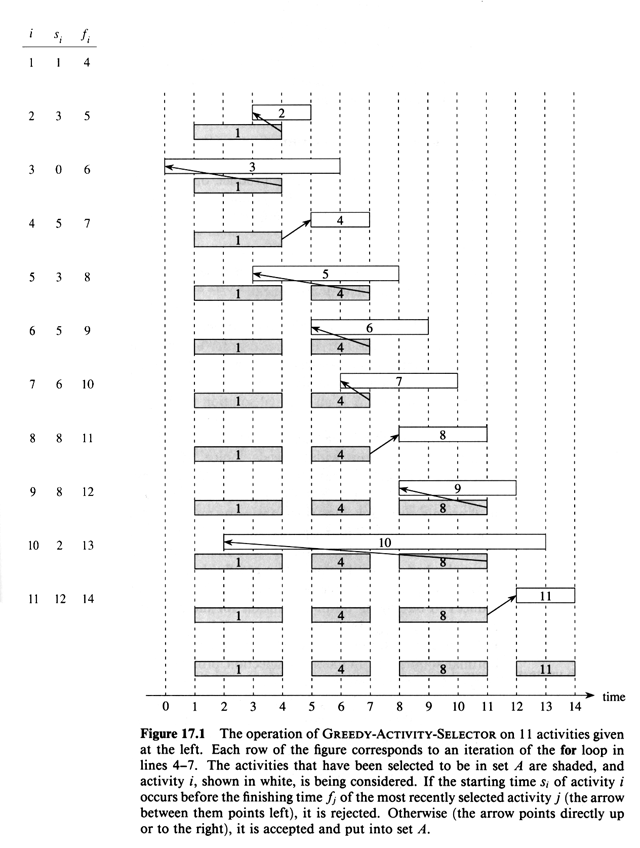Greedy Algorithms
When doing an optimization there are often may steps taken.
DP may often be overkill when a simpler more efficient "greedy
algorithm" would do. A greedy algorithm makes the best choice at that
moment, hoping this will produce the optimum in the long run.
An activity selection problem:
Optimal scheduling of a resource among several competing
activities (scheduling rehearsal times in a music studio)
Problem setup: S = {1, 2, ..., n} a set of n proposed
activities. Each activity has si a start time, and Fi
a finish time si £ fi.
If activity i is selected, the resource is occupied in the interval [si
, fi). We say i and j
are compatible activities if either or i.e. that
[si , fi)
Ç [sj ,
fj) = Æ
The activity-select problem is to select a maximal sized
subset of mutually compatible activities. Note: Here we maximize the
number of activities selected, but if the profit were proportional to si
- fi , this will not
maximize profit (renting out a hall.)
Greedy Algorithm:
Assume that f1 £
f2 £ ...
£ fn
Greedy-Activity-Selector ( s, f )
-
n ¬ length [s]
-
A ¬ { 1 }
-
j ¬ 1
-
for i ¬ 2 to n
-
do if si ³
fi
-
then A ¬
A È{ i }
-
j ¬
i
-
return A
The algorithm starts with { 1 } and checks to see which
can be added after 1, updating the golbal "finishing time" and
comparing with each start time. Note: fj is always the global
"finishing time" of previously selected activities.
Running Time:
-
sorting n activities by fj O ( n lg
n )
-
Greeed-Activity-Selector Q (
n )

The activity picked is always the first that is compatible. Greedy
algorithms do not always produce optimal solutions.
Theorem 17.1:
Algorithm Greedy-Activity-Selector produces solutions of
maximal size for the activities-selection problem.
Proof:
Let S = { 1, 2, ... n }, are sorted 1 has the earliest finishing time.
We wish to show there is an optimal solution that begins with activity 1.
Suppose A £ S is an optimal solution and the
first activity is k ¹ 1. We want to show that
optimal B exists that begins with 1. Let B = A - { k }È
{ 1 }. Since fi £ fk
all activities in B are disjoint and |B| = |A|, so it is
optimal. Now, when the greedy choice of 1 is made, the problem reduces to
activity selection on { 2, 3, ... n }, which are all compatible with 1. So
if A is the greedy optimum to S, the Ai = A - { 1 }is the
greedy optimum to S = { i Î S, si ³
fi}. Why, if we could find and optimal Bi to
Si with |Bi| > |Ai|, then Bi
È { 1 } would be optimal for S and |B| >
|A| which contradicts that A is optimal for S.
Thus after each greedy choice we are left with essentially the same
optimization problem. By induction the greedy algorithm always finds a
minimum, one activity at a time.
|







